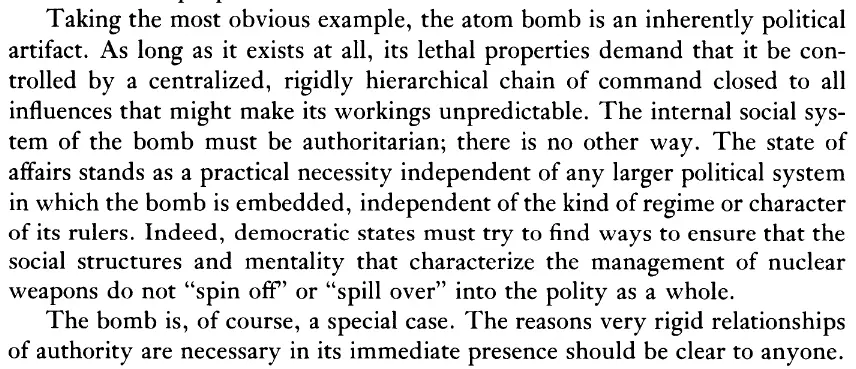Lengthy PDF discussing how certain technologies such as nuclear power shape power dynamics around them towards authoritarianism.
I’ve noticed serious political discussion on the relationship between technology and society has been extremely lacking, and articles like this one are sorely needed. For that reason, it is even more disappointing that it has been done so poorly.
A lot of the reasoning and arguments in the piece are muddled, in part because the reference point for those arguments, like Engels’ On Authority, are famously off-mark. Some refutations were magically written before Engels whet his pen, like God and the State in 1871, which clarifies the Engels’ intentional muddling of the anarchist position on authority, and incidentally, correctly identifies the State as a technology.

This is approximately where I stopped reading - any discussion of the nuclear bomb as a technology associated with authority that doesn’t reference Eric Arthur Blair’s writing shows a shocking lapse in scholarship. For a discussion of the relationship between technology and authority, You and the Atomic Bomb is a better place to start.
It is a commonplace that the history of civilisation is largely the history of weapons. In particular, the connection between the discovery of gunpowder and the overthrow of feudalism by the bourgeoisie has been pointed out over and over again. And though I have no doubt exceptions can be brought forward, I think the following rule would be found generally true: that ages in which the dominant weapon is expensive or difficult to make will tend to be ages of despotism, whereas when the dominant weapon is cheap and simple, the common people have a chance. Thus, for example, tanks, battleships and bombing planes are inherently tyrannical weapons, while rifles, muskets, long-bows and hand-grenades are inherently democratic weapons. A complex weapon makes the strong stronger, while a simple weapon — so long as there is no answer to it — gives claws to the weak.
I am not sure I get what you are trying to say. The two texts you have quoted are arguing the same idea. Is your objection that the earlier text isn’t mentioned as prior art of the same idea?
Overall I found the article quite ok, some smaller nit-picks aside that can be partially explained by how old it also is.
Edit: The text by Engels is used as an example for one possible view and the author makes it very clear that they just retell it and not that this is true or the argument they are trying to make themselves.
The two quoted texts are arguing the atom bomb is a hierarchical technology, but for different reasons. I think it’s instructive to compare the two - because the reasons given in the classic aren’t addressed in the recent discussion. I’ve since looked up Langdon Winner and apparently he’s a well respected scholar. I’m glad I’m not punching down here, but I realize this also makes me sound really pompous.
Winner claims atomic weapons are a special case, and they are hierarchical because the internal social system for using them is hierarchical. His basis of criticizing technologies is based on their apparent or expected social effects, and not the conditions and requirements of their manufacture. This is obviously flawed, as the social effect of a new technology depends on the society that adopts it. A tomato harvester in the hands of an anarchist society would be open-source hardware, and the increased productivity would increase leisure time for everyone working in the field rather than the profits of a capitalist owner.
Blair claims that atomic weapons are an extreme example of a general case, where a weapon is hierarchical because its expense and complexity limits access and thus the focus of power to the few, regardless of its internal social system. While his focus was on military application, a tomato harvester would probably be close to neutral tool given this basis - it is a difficult but reasonable thing for a community of working people to manufacture, especially compared to the scale of expense and complexity of a nuclear bomb. For Blair, it is a spectrum of technology giving democracy or authoritarianism the edge in a fight, progressing from bicycle to battleship and beyond. His rubric doesn’t include the modern computer, which is both extremely complex and expensive to produce but also ubiquitous and inexpensive to own - and the mixed role digital technology has played in the struggle between authority and freedom. But I would argue Blair’s work is the better place to start the discussion.
I think you are mis-representing or misunderstanding Winner’s argument. The atom bomb he says is unique because of the unique security requirements to not allow it to fall into the wrong hands (and as a result this distorts society toward authoritarianism), but elsewhere in the text he argues similar to Blair for nuclear reactors compared to renewable energy for example.
He also explicitly mentions that technology like the tomato harvester could be put to more equitable use in an anarchist society, but argues that this technology has a certain tendency to disempower farm-workers and thus shift the power balance towards capitalists, which is similar to the argument the Luddites had with certain types of weaving machines.
I may be misunderstanding his argument. I admit I only partially read the 17-page paper, and missed any acknowledgement of an anarchist contribution to the discussion.
I’ve also altered my comment since you replied but before I received your reply, so I apologize for any confusion this adds to the discussion.
He mentions/cites Kropotkin and talks about “decentralized, democratic worker self-management” which I think is code for Anarchists without mentioning the word itself.
The hand shaped the tool as the tool shaped the hand, in microcosm and macrocosm.



